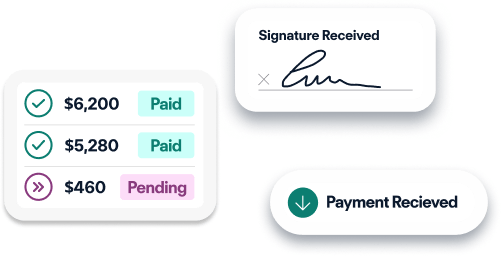Non-Disclosure Agreement
A non-disclosure agreement (NDA) is a legal document used to protect confidential information shared between parties. Discover the quickest way to draw up your own non-disclosure agreement with AI.
Bookipi’s eSign allows you to send non-disclosure agreements (or other documents) for digital signature, on mobile or web app. Try it out!

Alternative to Contract templates
There are faster ways to draft a contract and getting it signed online. Hi there, meet AI Contracts.
Generate a legally binding contract in minutes, customize it to your terms and send it for eSignatures – without ever changing tabs. Try it out!
Best AI-powered document generation tool to draft (and sign) contracts
Simply faster and better
Instead of starting from scratch or paying high legal fees, AI Contract walks you through a guided process to build contracts for you.
Improved accessibility
Sign or request for digital signatures from anywhere, anytime. Get digital signing on mobile devices or desktop.
Effortless collaboration
Multiple parties can sign a document concurrently with our digital signatures.

What is a Non-Disclosure Agreement (NDA)?
A non-disclosure agreement (NDA) is a legal contract between two parties that aims to keep confidential information safe. It restricts access to and sharing of sensitive information by third parties. By signing an NDA, both parties agree to keeping the specified information confidential and using it only for its intended purpose. NDAs are commonly used in business deals, partnerships, and employment to protect data like financial records, trade secrets, and customer lists.
How to manually create a Non-Disclosure Agreement
A non-disclosure agreement (NDA) is a vital tool in accounting to safeguard confidential information. Here are three simple steps to create an effective NDA:
Identify the parties:
Clearly list the parties involved—the one sharing confidential information and the one receiving it. Make sure to include their full legal names, addresses, and any relevant company information.
Define Confidential Information:
Clearly state what information will be kept confidential, like financial records or client lists. Be specific in identifying what information is considered confidential and what is not.
Include Terms:
Set terms like how long the NDA lasts, the receiving party’s duty to keep information confidential, and consequences for breaking the agreement. Use clear language and consider seeking legal advice to ensure the NDA is legally binding.
By following these steps, you can create a comprehensive NDA that protects your confidential information and ensures accountability between parties.
With AI Contract, you can instantly generate unique, customizable contracts tailored to your specific requirements, and get them signed online with eSign – convenient!
Purchase Order Form
A purchase order form is a document used in accounting to request and authorize the purchase of goods or services from a vendor.
Sales Agreement
A sales agreement is a legal document used in business transactions to outline the terms and conditions of a sale between a buyer and seller.
Service-Level Agreement (SLA)
A service-level agreement (SLA) is a contractual document outlining the level of service a provider will deliver to a client.
Employment Contract
An employment contract is a legal agreement used in human resources to outline the terms and conditions of employment between an employer and employee.
Employment Offer Letter
An employment offer letter is a formal document used in human resources to extend a job offer to a candidate.
Non-Disclosure Agreement (NDA)
A Non-Disclosure Agreement (NDA) is a legal document used to protect confidential information shared between parties.
Confidentiality Agreement
A confidentiality agreement is a legal document used to protect sensitive information shared between parties from being disclosed to unauthorized individuals.
Partnership Agreement
A partnership agreement is a legal document that outlines the terms and conditions of a partnership between two or more parties.
Loan Agreement Form
A loan agreement is a legal document used to outline the terms and conditions of a loan between a lender and borrower.
Franchise Agreement Form
A franchise agreement is a legal document that outlines the terms and conditions under which a franchisee can operate a franchised business.
Lease Agreement
A lease agreement is a legal contract between a lessor (the owner of an asset) and a lessee (the individual or business leasing the asset) that outlines the terms and conditions of the lease arrangement.
Independent Contractor Agreement
An independent contractor agreement is a legally binding document between a business and a contractor outlining the terms and conditions of their working relationship.
Distribution Agreement
A distribution agreement is a legal contract used in business to establish terms and conditions for the distribution of products or services by a manufacturer to a distributor.
Retainer Agreement
A retainer agreement is a contract between a client and a professional service provider, such as an accountant or lawyer.
Release of Liability Form
A release of liability form is a document used to waive any future claims or disputes against a specific party or entity.
Frequently Asked Questions (FAQs) on Non-Disclosure Agreement (NDA)
What is a non-disclosure agreement (NDA) and why is it important?
An NDA is a legal contract between two parties that keeps shared information confidential. In most industries, NDAs are crucial for protecting financial data, trade secrets, and client information from being disclosed or used without permission. NDAs may between the company and their clients or between the company and their stakeholders, terms of the NDA will be different according to the relevant parties.
How do NDAs benefit firms and their clients?
By signing an NDA, firms reassure clients that their sensitive information will be kept confidential. This builds trust, protects the firm’s reputation, and ensures the security of the client’s data and any confidential information that the firm may come across.
What should usually be included in an NDA?
An NDA should clearly state the confidential information, involved parties, sharing purpose, duration, and penalties for breaches. It should also detail how the information will be securely handled and stored.
Can NDAs be enforced in court if breached?
Yes, if one party breaches the NDA by sharing confidential info, the injured party can enforce it in court and seek damages for any harm caused by the breach.
By using eSign for NDAs, you can ensure that all parties will have a copy of the contract for easy reference. Try eSign out for free!
How can businesses ensure compliance with NDAs?
To ensure compliance, firms should educate employees on confidentiality, common oversights, provide secure information handling training, and monitor data access. Regular audits help prevent breaches and protect client information, maintaining the firm’s trusted reputation.
*Information provided on this page are for informational purposes only and do not constitute legal advice. While Bookipi strive to ensure accuracy, we make no guarantees regarding the suitability or completeness of this resource. If unsure, it is recommended to consult with a qualified legal professional before creating a template on your own.
*Information provided on this page are for informational purposes only and do not constitute legal advice. While Bookipi strive to ensure accuracy, we make no guarantees regarding the suitability or completeness of this resource. If unsure, it is recommended to consult with a qualified legal professional before creating a template on your own.

Bookipi Invoice mobile app
Send invoices & receipts on mobile app (iOS & Android) - from anywhere ...
Learn more

Proposal AI
Create professional, brand-aligned proposals in minutes with a simple AI prompt. ...
Learn more

AI Website Builder
Generate your website with AI, add pages and customize it to your brand. No coding required, and hosting included ...
Learn more
Get started in minutes
5-minute setup, no credit card needed.

